Europe Talks: Europe's biggest dialogue program
Every Saturday in April and May, thousands of Europeans will meet for an unmoderated, one-on-one conversation. Follow the discussions in our weekly event reports.
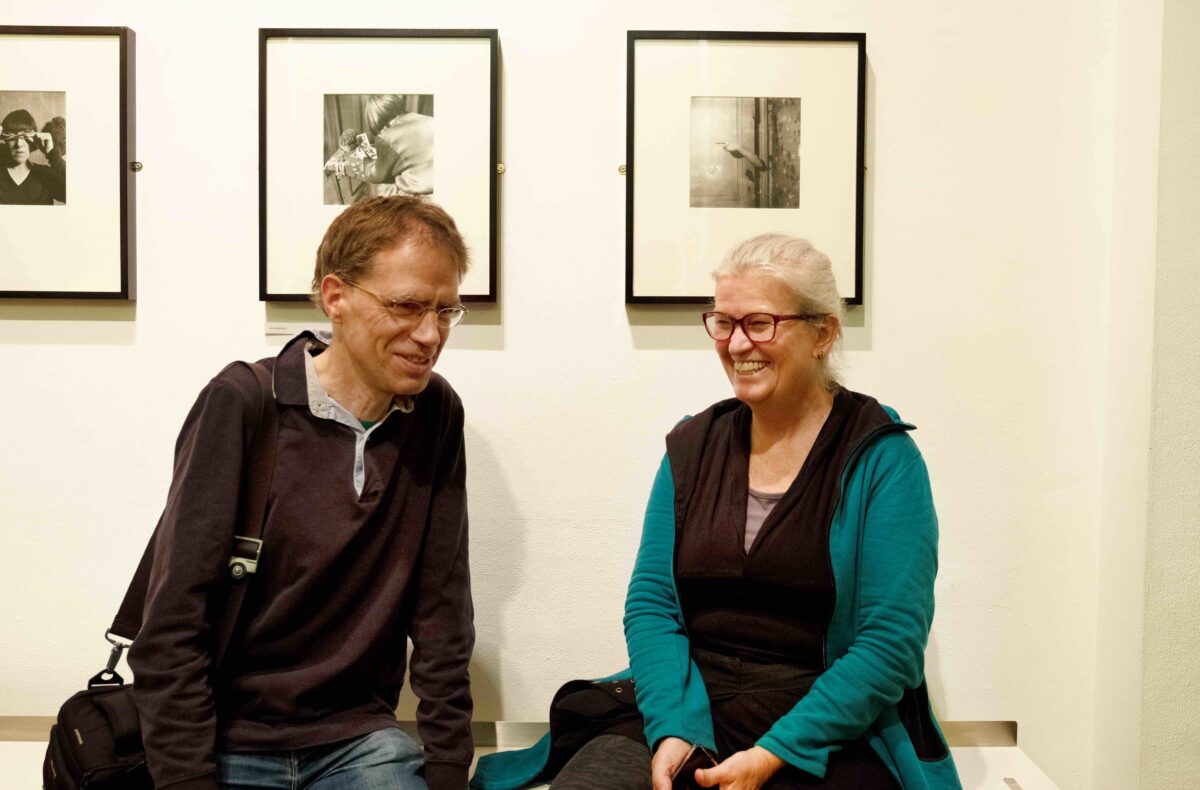
Every Saturday in April and May, thousands of Europeans will meet for an unmoderated, one-on-one conversation. Follow the discussions in our weekly event reports.

In June, EU citizens will elect a new European Parliament. With climate change, rising extremism, and multiple global crises, it is more important than ever to create spaces for Europeans to talk across borders. That’s the goal of Europe Talks, the biggest pan-European dialogue program in 2024.
Each Saturday in April and May, hundreds of Europeans will meet for a 1:1 conversation. The weekly dialogue events give participants an open platform to exchange ideas and widen their perspectives by meeting someone with a totally different point of view. There’s never been an easier way to meet another European and talk about the biggest challenges facing our shared future.
Follow the dialogue events here, we'll update with new stories each week. Ready to try it yourself? Sign up for Europe Talks now!
Last Saturday, May 25, 2024, our Europe Talks participants had their last encounter in this year's edition. Time flew. We started our dialogue days on April 6 and have been reading the feedback from our participants for two months. During these past eight weeks, 5,157 participants had the opportunity to chat via video calls or write emails to someone from one of the 39 different countries that took part in the program.
Their most common shared opinion was that, despite having completely different views on current affairs, when you listen to the other person, you start understanding their ideas and why they might think that way.
This situation occurred with Anna (57) from Italy and Christiane (58) from Austria. This pair disagreed on four out of the seven questions: the banning of domestic flights, having a joint European army, the acceptance of more refugees, and the possibility of Ukraine becoming a new member of the EU. Despite their differences, the two women spoke cordially for two hours. Anna said, “The good thing is that when people are open-minded and willing to listen to others, it is possible to find solutions to many problems.”
A stance that another pair, Irene (54) from Germany and Benedetto (64) from Italy, might have shared. They also did not share the same opinion on the acceptance of more refugees, the membership of Ukraine within the EU, the banning of domestic flights, and having abortion as a constitutional right. Despite their disagreements, they spoke for over an hour, and Benedetto even shared, during their video call, his garden and plants with Irene because they found out that they shared a common “love for plants and nature.”
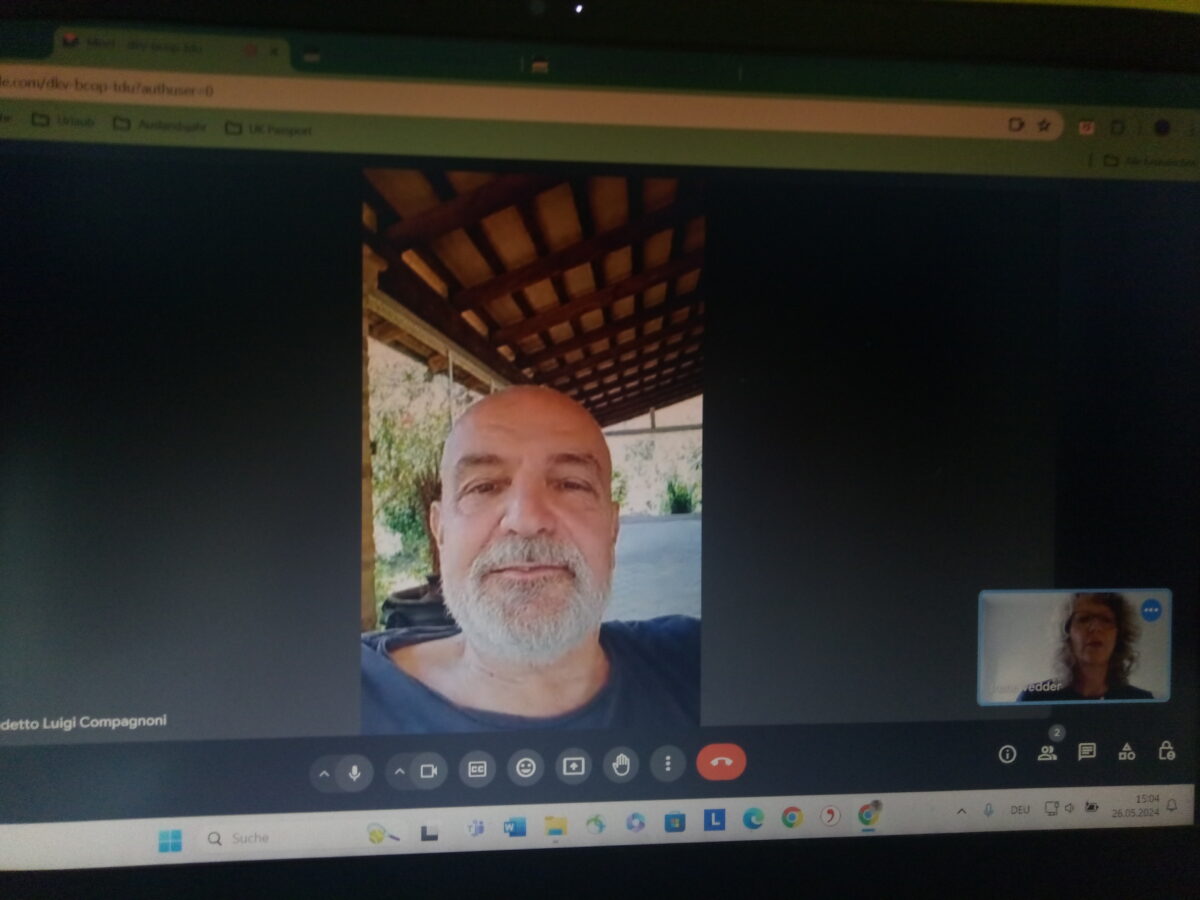
Despite disagreeing on four questions out of seven, Irene and Benedetto found their “common love for nature”
Another thing that Europe Talks has shown our participants is how people in different countries understand the reality of current political affairs. This thought was shared by Manfred (62) from Austria when he spoke with his Lithuanian partner Aušra (33). They spent two hours discussing the political situation in their respective countries and the history and relationship of Russia with Ukraine. “The view from people in the Baltic states regarding Russia is totally different than in Germany, Austria, or France. It is clear and realistic,” said Manfred after his conversation with Aušra.
Now Europe Talks 2024 has come to an end, let’s take a look back at our digital dialogue program. Across the eight events, more than 2,200 people met for a conversation across borders and political divides. They came from 39 countries, across the whole European continent, and all walks of life. Here you can see how everyone who registered, more than 5,150 people, answered the discussion questions which formed the basis of these conversations.
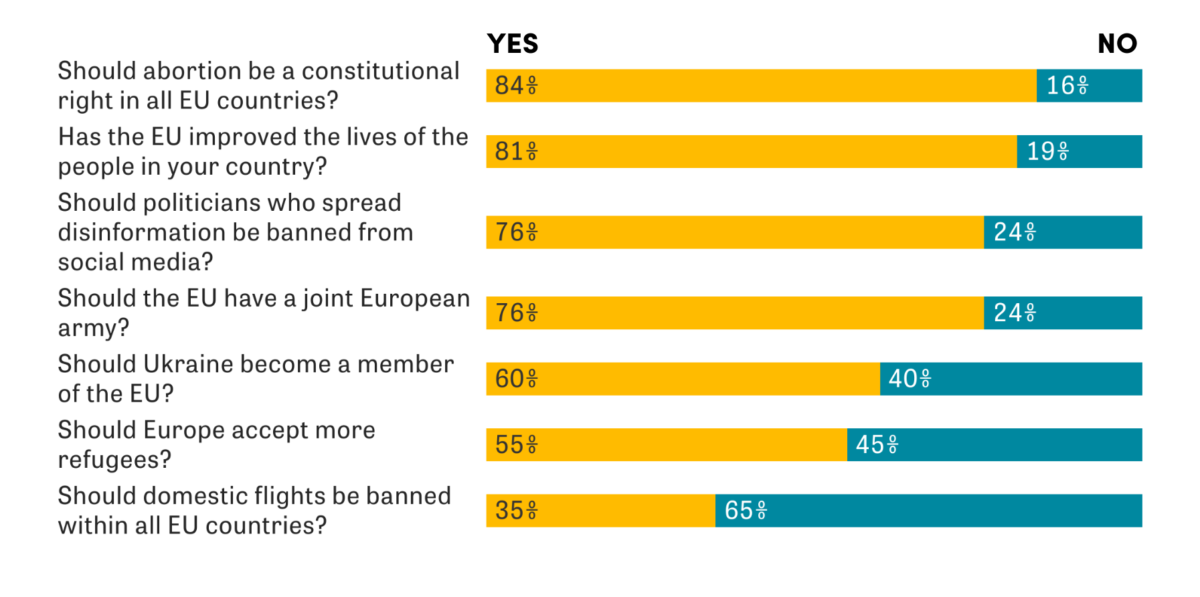
We hope that our participants, and everyone who read stories in our media partner network about the program, have a new perspective about European issues and our shared future. As EU citizens go to vote in the Parliament election next week, it’s more important than ever to remember that our problems don’t stop at the border, and we must work together to find solutions.
On May 18th, 2024, people from across the continent met to discuss controversial topics that will define the future of the European Union for the next few years, such as climate change, migration, and membership policies. The EU elections are happening in two weeks (6-9 June).
The Europe Talks conversations may seem challenging at first. Meeting with a complete stranger via a video call who disagrees with you, sometimes on most of the discussion topics, can seem scary. But our participants have proven that wrong.
This is the case of Jan (55) from Germany and his Italian partner Fabio (67). They did not share the same opinion on six out of the seven questions. Their only common ground was that domestic flights should be banned. They reported that they started their conversation by opposing what the other was saying, but as they spoke, they became closer in their opinions, “finding common agreement on the topics,” pointed out Jan. They both thought that being engineers was helpful in discussing the possibility of having topics like having an EU army and Ukraine's membership within the union.
Another German-Italian couple who found common points as their conversation developed was Mario from Italy (57) and Jonas from Germany (26). They disagreed on 5 out of 7 questions, such as whether abortion should be a constitutional right, the acceptance of more refugees, and the possibility of Ukraine becoming a member of the EU. Jonas’ answered “yes” to all of those questions, while Mario leaned towards “no”. But during their one-hour conversation, they were able “to find common ground on all topics,” said Jonas.
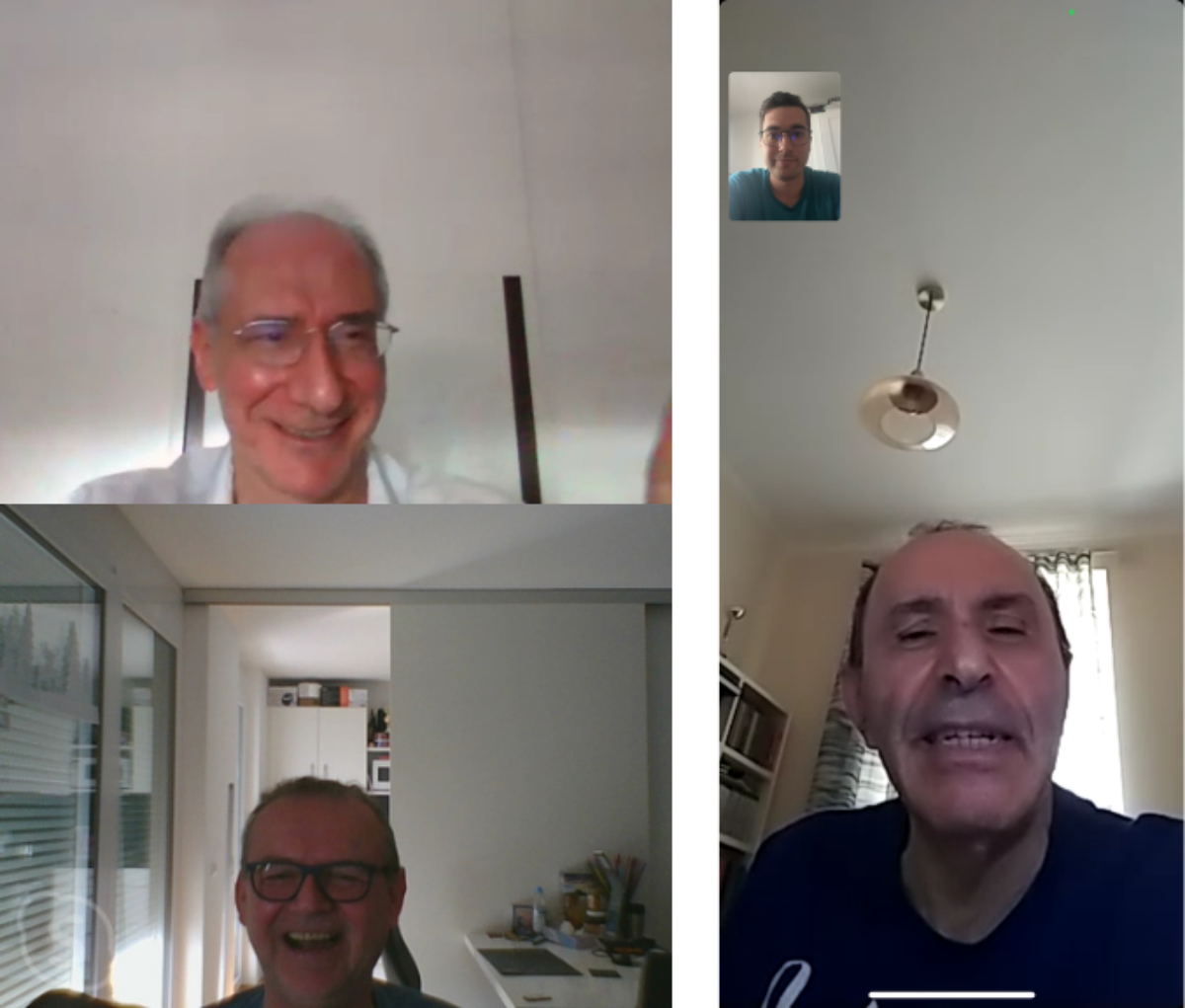
Jan and Fabio (left) disagreed on almost all the questions, but when speaking to each other, they found a common ground. Jonas (small) and Mario (big) have a 50-year age gap, but this was not an impediment to hold an insightful conversation on the topics they disagree about.
Fostering dialogue about topics two people disagree on is the main goal of Europe Talks. The conversations between the two matched participants do not have to stop the day they meet; on the contrary, they’re free to continue talking as much as they like. This is what Gabriel (28) from Germany and David (33) from Austria have been doing since April 14. The paid have been discussing two topics on which they do not share a common opinion: the ban of domestic flights and the acceptance of more refugees, and went deeper into other issues such as political parties, climate policy, and even hunting—an activity they both found they share in common.
Giulia (40) from Italy and Dominique (60) from Austria only disagreed on two questions. Therefore, when they met during a one-hour video call on Monday, they broadened the topics of their discussion. They debated what to expect from the European Union in these upcoming elections and talked about the younger generation. They both agreed on the importance of promoting the EU among the youth. For Giulia, this young generation seemed more involved in many topics, and she was happy to hear from Dominique, who’s a teacher, that they really are.
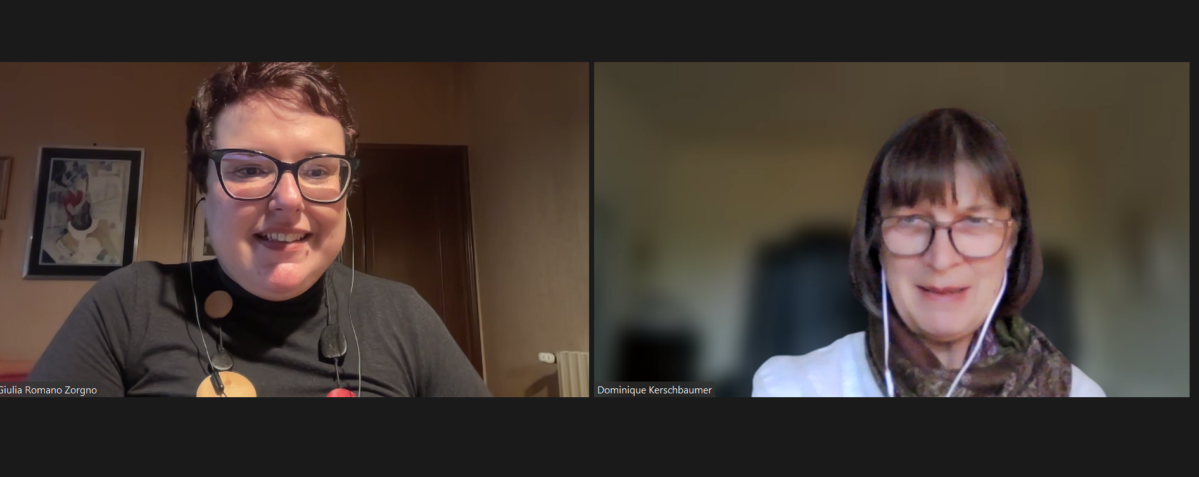
Giulia (left) and Dominique (right) talked for an hour.
With the European elections around the corner, Europe Talks participants from different countries in the continent met to discuss the most concerning issues that affect the European Union.
One question that unifies participants from more than 30 countries is that the European Union has improved their lives, with 82% saying “yes” to the question. Where they disagreed the most were on the acceptance of more refugees (55% answering yes) and the possibility that Ukraine may become a member of the block (60%). Besides this, another topic was discussed among some of the matching partners: the state of the media.
Tobias (31) from Germany and András (39) from Hungary spoke about the role the media industry plays. Discussing politics, they talked about how Hungary’s prime minister is perceived “differently in Hungary and the rest of the EU”. In Tobias' opinion, the media should become more diverse and cover a wider range of topics. What surprised Andrá the most about their conversation was Tobias' reaction when he mentioned that there are no pro-Palestine protests in Eastern Europe.
Kai (51) from Germany also discussed the state of the media with his Lithuanian partner Monika (46) for over an hour. They disagreed on the ban of politicians from social media when they spread misinformation, as well as the prohibition of domestic flights and the acceptance of more refugees. However, it was the question related to expelling the politicians from social media that prompted their long conversation about the media. Kai was pleased to talk with his partner because it reminded him of the limitations of reporting. “Media has always described one side of the situation from a country, therefore you form an idea about it, but it’s limited”, says Kai. Talking to Monika was “more interesting and gives a better idea of life in her country”.
Another couple from Germany and Lithuania, Merlin (20) and Sorenas (29), met this past weekend in a video call to speak about the topics they disagreed on and on current geopolitical affairs. The idea of a European federation, the state of pacifism in times of war, and the war happening in Gaza were the topics they explored more deeply. After a two-hour discussion, they both shared a very positive feeling about their dialogue: “I think the discussion with Merlin gave me new insights into various things that might change in our life because of politics”, says Sorenas. Merlin adds, “I was surprised by the great interpersonal connection”.
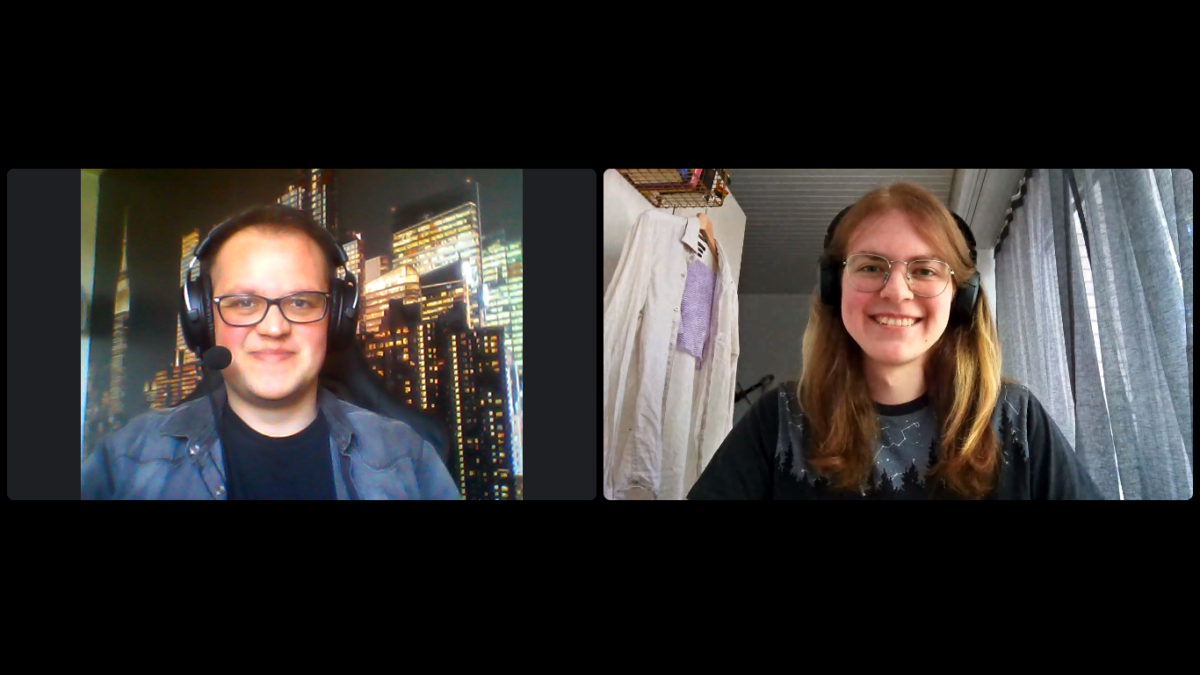
Merlin (left) and Sorenas (right) spoke for two hours this past weekend. “How likely is it to get such a great match with so little information provided by the organisers”, says Merlin.
With just one month remaining until the European Elections (6-9 June), our Europe Talks participants continue to engage in deep and insightful conversations.
On May, 4th, 2024, people from across the continent met in a video call to discuss polarizing topics related to immigration, climate change, abortion and the EU itself. While couples diverged in opinions, another week has shown that, when dialogue happens, a tolerant understanding prevails.
This was evident in the conversation between Sandra (57) and Simon (34). They only agreed on one question out of seven questions, which was that Europe has improved the lives in their respective countries: Germany and Austria.
Despite their differing opinions, their conversation started in “a ping pong of arguments in an atmosphere of not listening” writes Sandra. However, they found their way to a more cooperative discussion. This was key to stopping “the provocative black and white questions and answers”, Sandra explains, and they even found common grounds in their opinions. As they began to listen to each other's arguments, the conversation flowed more smoothly.
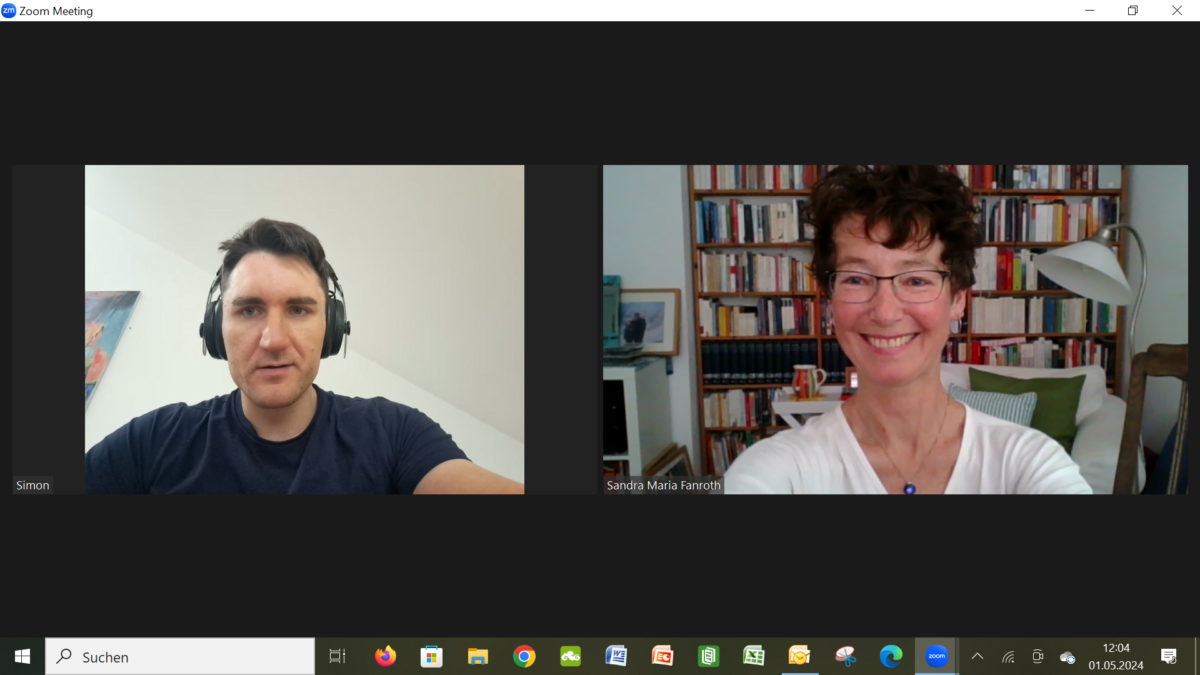
Simon and Sandra spoke for an hour about AI, energy solutions for the future and even martial arts!
Teresa (62) from Italy and Stefan (64) from Germany did not agree on any of the discussion questions, but “we both agreed on the terrible outcome for Europe”. Despite this, they would have continued their almost-two-hour conversation if they didn’t have to attend to personal affairs. Their conversation went deeper into the Russian-Ukrainian war, the overpopulation linked to the disappearance of natural resources, and the refugee crisis. Stefan fears that Putin will not stop any time soon, that natural resources will not be enough for all, and that financial support to refugees should be handled more carefully. Teresa, on the other hand, is positive about the outcome of the war and, and feels that we have to be careful with hate speeches towards refugees and migrants, “the weakest part of the population”.
A couple that spent two hours and a half talking was Alan (34) from Austria and Georgia (34) from Greece. For them, the enrichment of this experience was to have had the opportunity to discuss European affairs with another person with a historical and cultural background so different from their own.
They discussed topics on which they didn’t share the same opinion, such as abortion, the acceptance of more refugees, and the idea of having a common EU army. They also talked about their respective countries. Georgia was surprised to learn that people in Austria also faced economic struggles, and Alan was positively amazed to find a “such great and understanding conversation partner”, which is why their conversation lasted so long.
Henrikas (29) from Lithuania and Ondrej (36) from Slovakia spoke for almost two hours this past weekend. After their long conversation, they discovered that they agreed on all seven questions, and not only the two which they answered the same in the questionnaire: that abortion should be a constitutional right and the idea of having a common european army. Their differences, on paper, primarily came when answering Yes/No questions without explaining their personal reasons for the answers.
They also spoke about different ideologies related to rural versus urban backgrounds. Ondrej explained to Henrikas that in Slovakia, this distinction plays an important role, as villages tend to be more pro-Russia. He assumed a similar situation existed in Lithuania, but Henrikas clarified that this difference isn't as pronounced when discussing the "Russian sentiment."
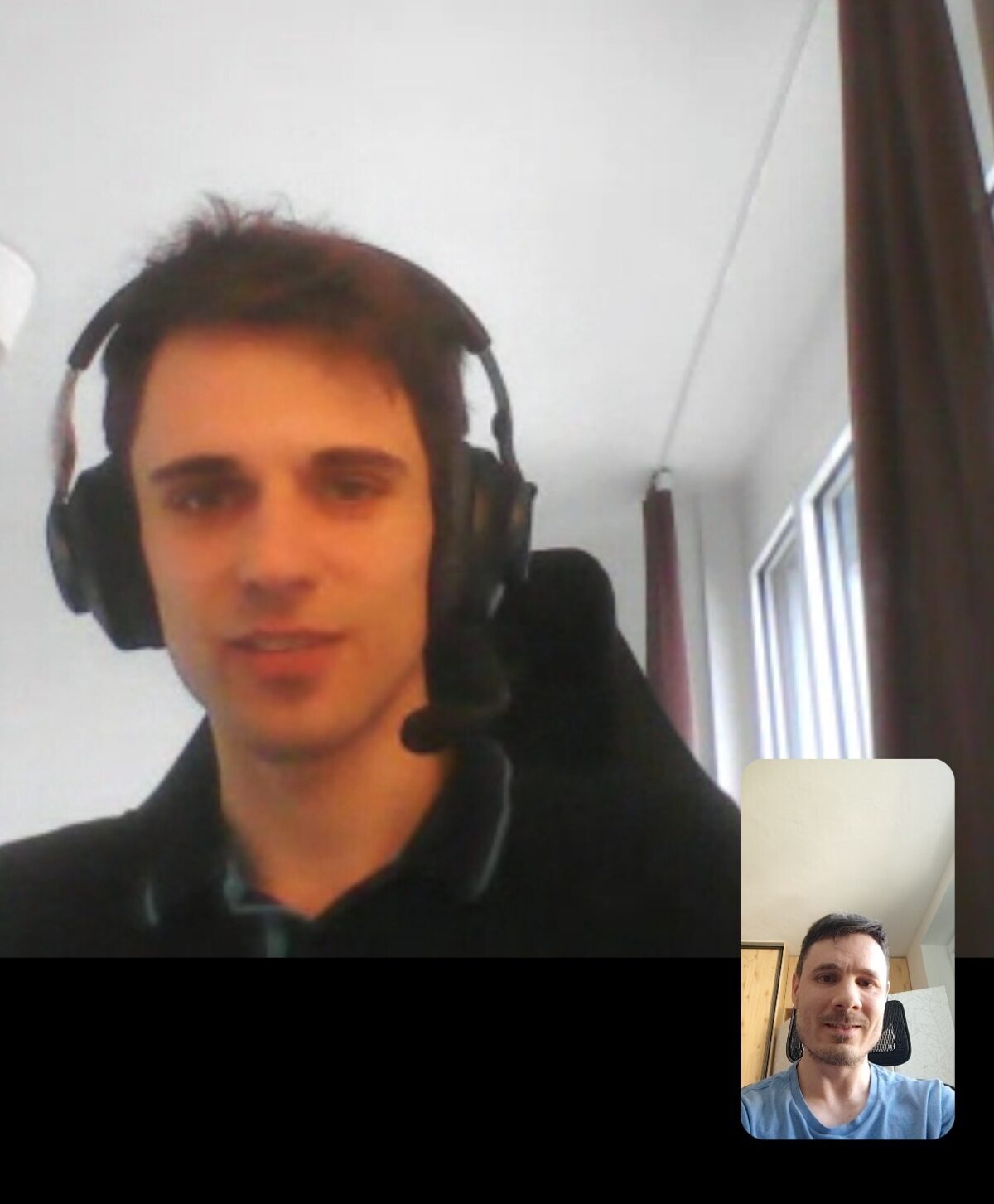
“I initially assumed we may have a few points where we will disagree, but it turned out that everything was almost identical.” says Hendrikas (small) about his conversation with Ondrej (big)
This past Saturday, April 27th, 242 participants met a total stranger with different opinions for the fourth dialogue event of Europe Talks 2024.
Most participants had between three and six different topics to discuss, out of the original seven matching questions. The questions our participants shared a common idea about were whether abortion should be a constitutional right (83.7% responded positively), and they also agreed, with 80.8%, that Europe has improved the lives of their countries.
This weekend, Leon (18) from Germany and Christian (32) from Austria spoke for over two hours on six questions they disagreed on. They spent most of their time discussing compulsory military service for young adults and the prohibition of diesel cars. Leon, who leaned towards having a joint European army, said “actually, my partner had really great and convincing arguments against a joint EU army. He changed my point.” Christian said that, despite answering very differently to the questionnaire, when they talked, they found out they shared similar views. “I would like to participate again” said Christian.
Despite a 42 year age gap and the distances between their home countries, Inga (27, Lithuania) and Federico (49, Italy) agreed on most of the matching questions. The disagreement came from the two most polarizing questions so far: the acceptance of more refugees and the potential membership of Ukraine in the European Union.
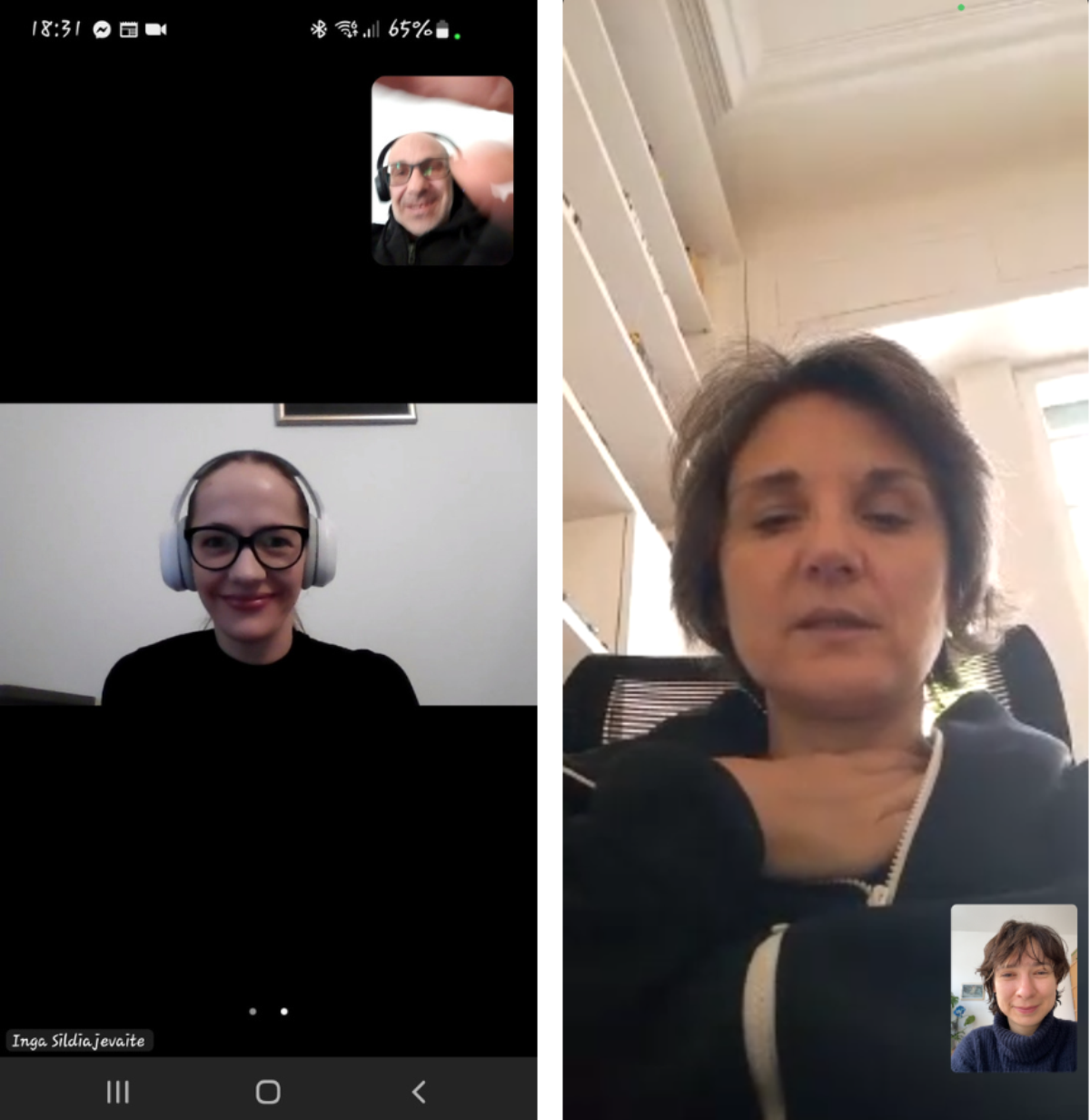
Inga from Lithuania and Ricardo from Italy (left) spoke over two hours on April 27th, 2024. They focused on Ukraine and the current geopolitical situation in the world.
Chiara from Italy and Anyuta from Belgium (right) spoke for an hour. They disagreed about the question of whether politicians should be banned from social media when spreading disinformation.
The longest conversation by far was between Roberto (63) from Italy and Martin (63) from Germany, who have kept their conversation going for the past month! Roberto and Martin have been continuously emailing each other since the end of March. “We love writing. You have time to think about the email your partner sent you and respond to it,” explains Martin. Together, they are exchanging ideas for a peaceful Europe.
This past Saturday, April 20th 2024, our Europe Talks participants met for the third dialogue day. The majority of them opted to speak through video platforms.
Once again, the most polarizing question was “Should Europe accept more refugees”, with 56% of the participants answering yes. The other concern that polarizes most of the Europeans was the potential membership of Ukraine in the EU. This week, 60% of the respondents voted in favor, while 40% opposed.
Over the weekend, the conversations among Europe Talks participants have proven that differences in countries of origin, political ideology, or age are not barriers to holding respectful, insightful and productive discussion about the future of Europe.
Giorgos (56) from Greece,and Lilli (26) from Germany talked for over an hour about the six out of seven questions on which they differ, including the most polarizing questions of this week. They also went beyond in their discussion and brought to the table the 2008 financial crisis, public education and NATO.
It was surprising for them to discover that they held common opinions on the topics they initially disagreed on. Lilli explained that clicking "yes/no" in the questionnaire led them to "choose different sides," but their online conversation helped them find "a middle ground."
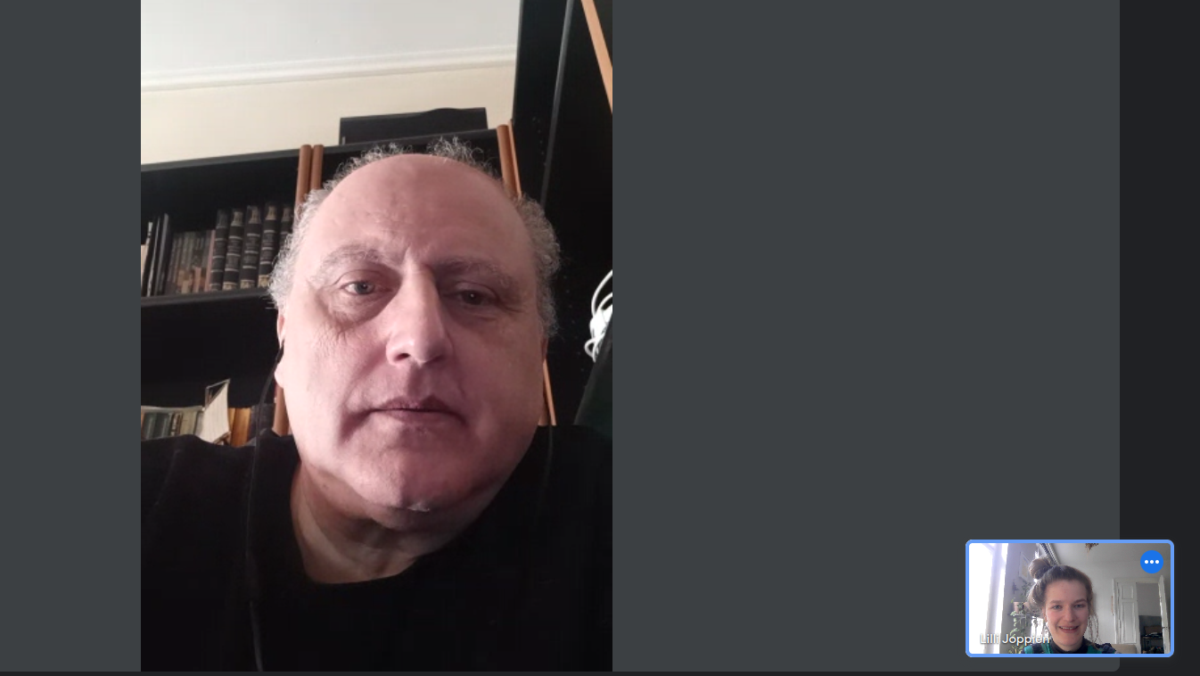
Despite the 30 year gap, Giorgos (left) said that they both have “a strong European identity”
Markus from Austria (63) and Rosario from Italy (28)also spoke for over an hour despite their age gap, discussing questions in which they disagreed, such as whether abortion should be a constitutional right in all EU countries. They also talked about topics they shared similar thoughts, such as the future of the EU. For Markus, the common currency is “a differentiating point” between the Gen Z and his generation, as “they did not experience Europe before the Euro”.
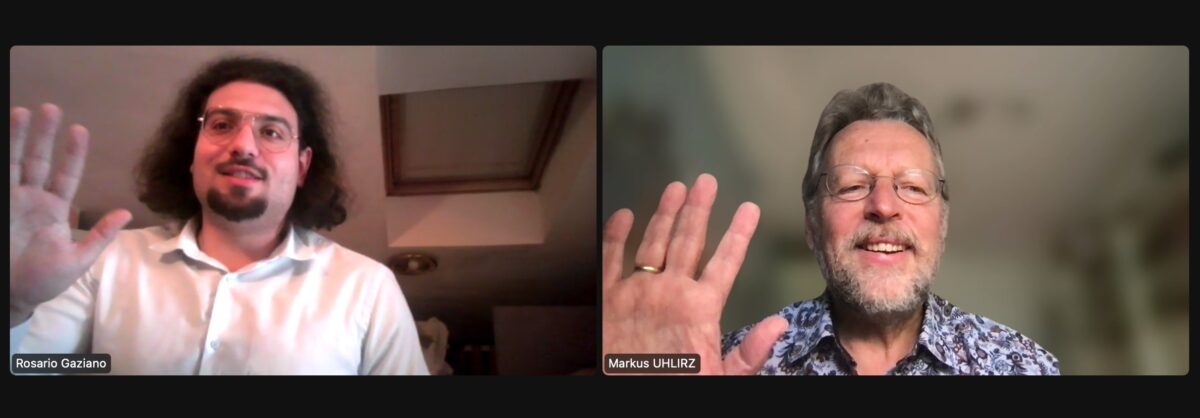
Rosario (left) and Markus (right) spent over an hour discussing the role and the future of Europe
Katharina from Germany and Serenella from Italy disagreed on all questions except one, therefore they had a lot to discuss in their hour and a half chat. They discovered that they shared opinions on certain questions, but for different reasons. Katharina thinks that their countries' historical and cultural backgrounds might be influencing their perspectives. She was surprised to learn that Serenella believed the EU has not improved life in Italy.

Katharina and Serenella having a joyful conversation on April 23rd.
Max (Austria) spoke with Carlota (Portugal) for over an hour. They put together their different approaches to certain political topics, such as whether domestic flights should be banned within all EU countries or if the EU should have a joint European army, and try to find ways how they can contribute to these issues. In Max words: “This was one of the most rewarding conversation in the last 10 years.”
The second dialogue day of Europe Talks took place on Saturday, 13th April, 2024. The 148 matches met mainly via online video platforms.
Once again, the most polarizing question was: “Should Europe accept more refugees” with 56% responding “yes" and 44% answering “no”. Followed closely by “Should Ukraine become a member of the EU?”, with 59% responding positively and 41% opposing.
Enrico from Italy and Sebastian from Germany disagreed on six of the seven questions. The acceptance of more refugees and the possibility of Ukraine becoming part of the EU were among those.
During their two hour conversation, they discussed all the questions but focused particularly on the refugee issue. Both went beyond the polarizing yes/no dichotomy to try to understand the phenomena that generated these questions in the first place. They had a deep conversation which resulted in a “veeeery interesting” discussion in Federico’s words.

Enrico from Italy (left) and Sebastian from Germany (right). They talked for 2 hours, especially on the topic they disagree with the most: the acceptance of refugees.
Another couple, Martina (Germany) and Christian (Austria), also searched for deeper answers than the yes/no responses. Despite disagreeing on five questions, including in the idea of a common EU army and in the ban of domestic flights, they spoke for three hours. As Martina puts it: “Both of us were more reflecting characters and not black and white thinkers”.
Anne from Germany and Carlo from Italy did not share the same opinion on the two most polarizing questions this week, as well as four others. In addition, they have a language barrier. None of this was an impediment to talk for an hour about these questions, their personal lives, professions and their similarities, with the help of a translator.
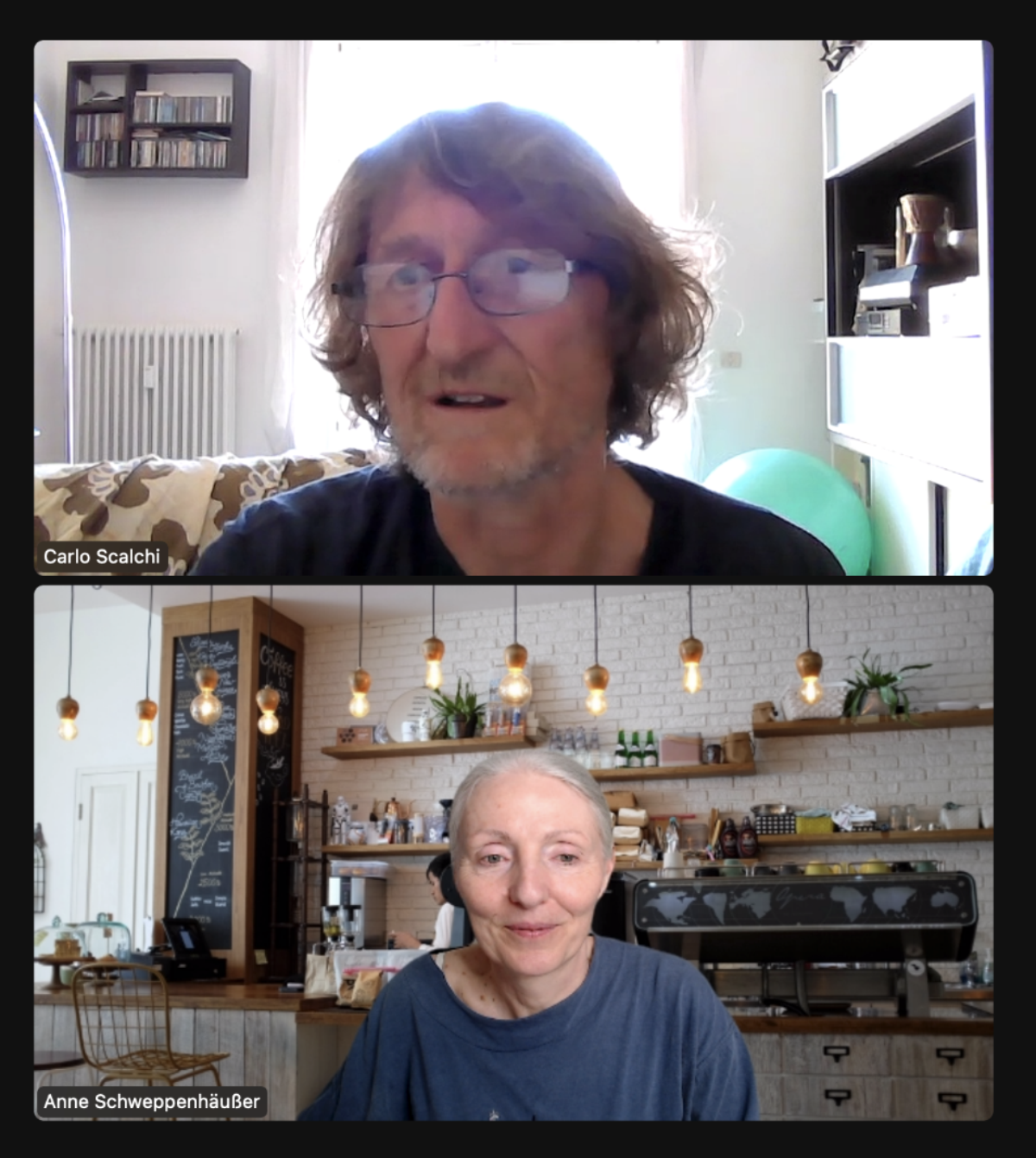
“There was a language barrier but at the same time a heartful attempt to understand each other”, said Anne.
The first event in the Europe Talks 2024 program took place on April 6. There were 179 matches who confirmed to meet for the first event, either on the dialogue day or when it was possible for both partners to have their conversation. Most participants spoke via video call, while others talked on the phone, on an encrypted messaging app, or simply spent the afternoon exchanging voice messages.
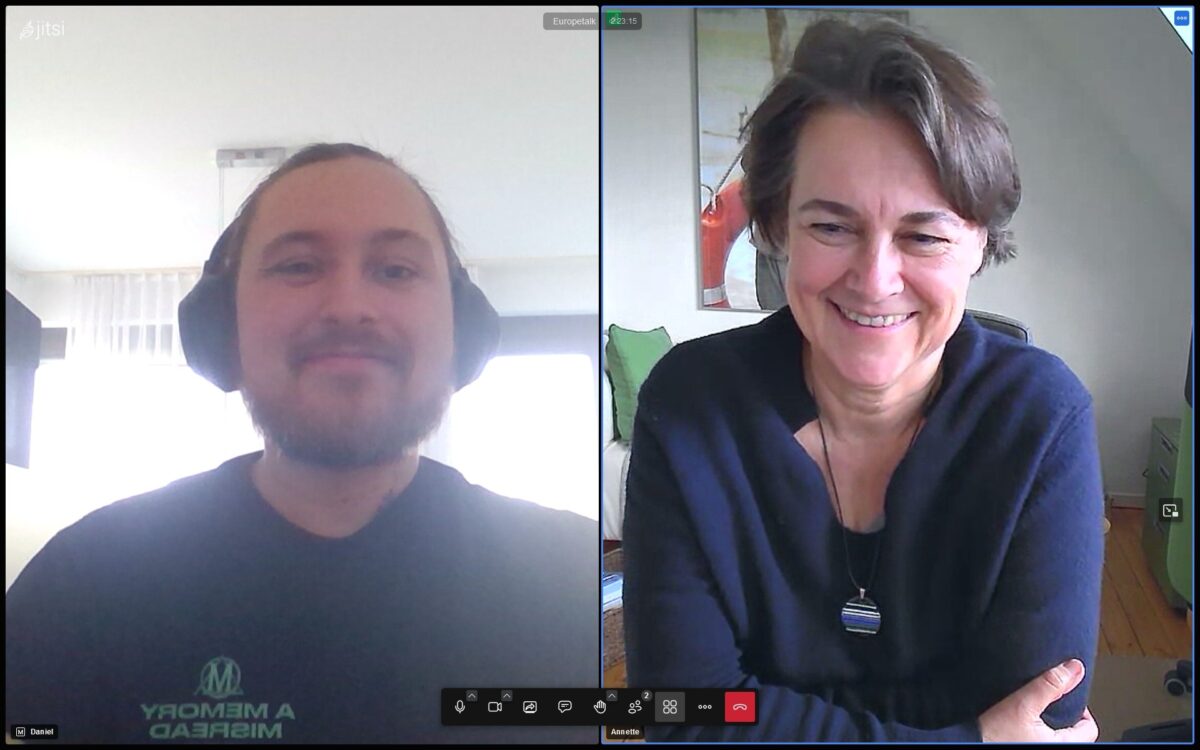
Daniel and Annette talked for 2 hours about climate change, a European army, and abortion rights. They had many similar views, even though they answered six questions differently.
For the first dialogue day, discussion pairs had an average of 4 different answers to the registrations questions. The most polarizing question in the first round of matching was "Should Europe accept more refugees", with 55% of participants saying "yes", and 45% saying "no".
One pair who disagreed on this question of refugees was Isabella from Italy, and Nick from Greece. Both are 30 years old, and found they had a lot in common despite their different views - talking about politics but also sharing their daily life and even talking about music. They spent their conversation brainstorming ways that the EU could be better organized.

"I liked how we talked fluidly without judgment and we reached so many topics." - Isabella from Italy
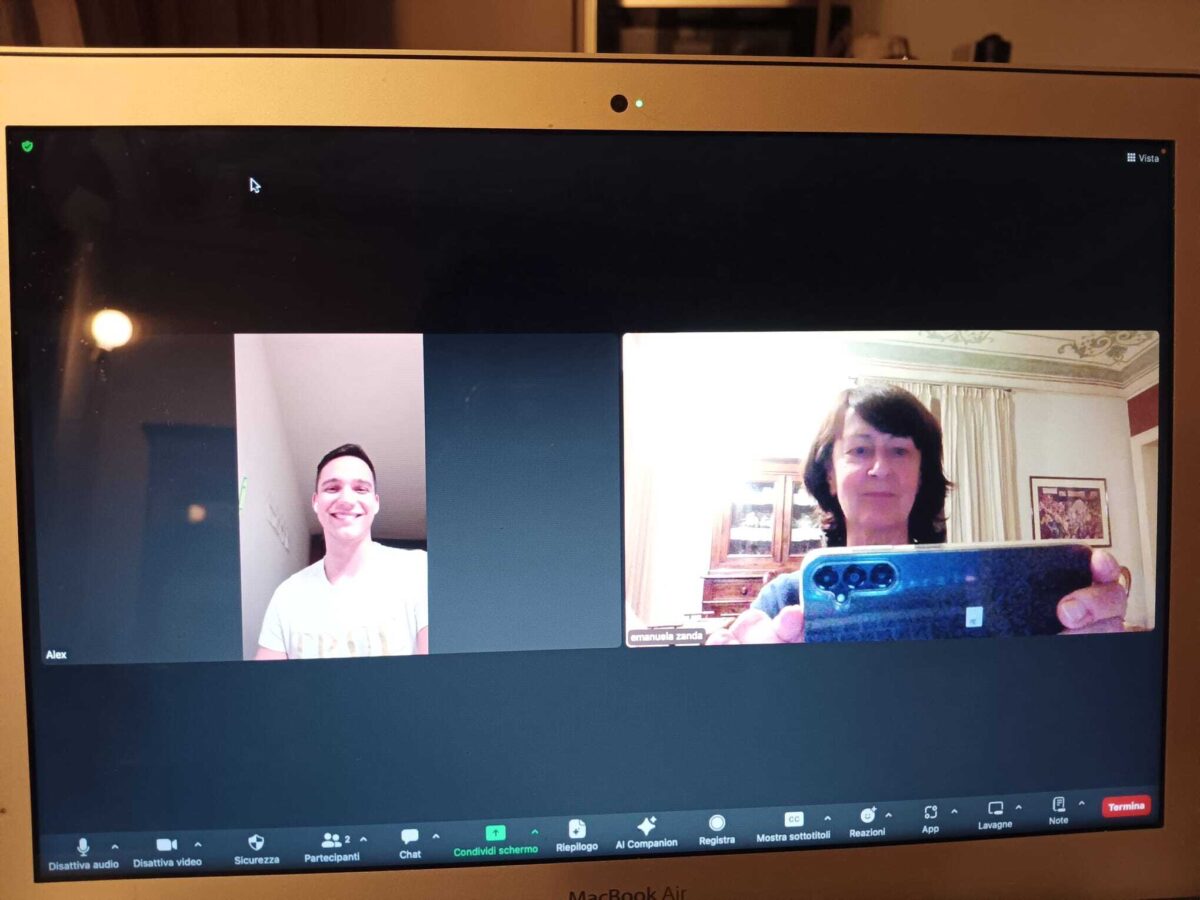
"The problem is 'not to talk' not 'having different opinions' " says Teresa from Italy. She and her partner, Alex from Slovakia, have an age difference of 47 years, but still spoke for more than 90 minutes about their opinions and views.
The next dialogue day takes place on April 13. You can sign up to join Europe Talks here!